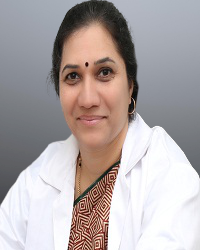Search Result: 3

Dr Bharathi Sundar M
MBBS, DM(Neurology)
Registration No
616621
Language
English, हिंदी, ಕನ್ನಡ, தமிழ், తెలుగు

18 years experience overall

KK Nagar , Madurai
MON, WED, FRI, MON, WED, FRI(01:00 PM-02:00 PM)

Dr Karthik S N
MBBS, MD(Gen.Med), DM(Neurology)
Registration No
179423
Language
English, বাংলা, हिंदी, தமிழ்

18 years experience overall

KK Nagar , Madurai
MON, MON | TUE- THU, TUE- THU(12:30 PM-03:00 PM | 12:30 PM-04:00 PM)

Dr Suresh P
MBBS MD (Neurology), SCE (Neurology) UK
Registration No
509437
Language
English, தமிழ்

10 years experience overall

KK Nagar , Madurai
THU- SAT, THU- SAT(12:30 PM-04:30 PM)
Frequently Asked Questions for s in
Yes, dementia can affect emotions and lead to changes in mood and behaviour. Individuals with dementia may experience depression, anxiety, irritability, agitation, or apathy. Diagnosis and treatment can help manage these emotional symptoms.
Dementia can disrupt communication skills, making it difficult for individuals to express themselves or understand others. They may struggle with finding words, following conversations, or maintaining coherence. Techniques such as using visual aids, simplifying language, and providing a calm environment can aid communication with dementia patients.
Chronic stress can contribute to a heightened risk of developing dementia or worsening symptoms in individuals already affected by the condition. Stress management techniques and adopting a healthy lifestyle can help relieve the brain of chronic stress.
A severe traumatic brain injury (TBI) can potentially increase the risk of developing certain types of dementia, such as Alzheimer’s disease or chronic traumatic encephalopathy (CTE). However, not all TBIs lead to dementia, and the risk varies depending on factors like the severity of the injury and individual characteristics.
The fastest progressing dementia is usually associated with Creutzfeldt-Jakob disease (CJD), a rare, degenerative brain disorder that leads to rapid mental deterioration and neurological symptoms.
In some cases, dementia can have a hereditary component. Some genes are associated with a heightened risk of developing various forms of familial dementia, such as Alzheimer’s. However, most cases of dementia have complex interactions between genetic and environmental factors.
Yes, some forms of dementia, such as Lewy body dementia, can cause hallucinations. These hallucinations may involve seeing or hearing things that are not present. It is important to discuss any hallucinations with a doctor.
Dementia is challenging to cure because most cases are caused by irreversible brain damage. Current treatments mainly focus on managing symptoms and slowing down the progression of the disease.
If left untreated, dementia can progress and worsen over time. It can lead to memory loss, impaired judgment, difficulty with daily tasks, a decline in cognitive function, behavioural changes, and eventually dependency on others for care.
If you or your loved ones experience persistent memory loss, confusion, difficulty with everyday tasks, personality changes, or language problems that interfere with daily life, it is advisable to consult a doctor specializing in dementia for proper evaluation and diagnosis.
The primary cause of dementia is neurodegenerative diseases such as Alzheimer’s disease. Other causes include vascular diseases (such as stroke), Lewy body disease, frontotemporal disorders, Parkinson’s disease, Huntington’s disease, traumatic brain injury, and certain infections or metabolic disorders.
While there is no guaranteed way to prevent dementia, certain lifestyle choices can lower the risk. These include staying mentally and physically active, eating a balanced diet, managing chronic conditions like diabetes and hypertension, avoiding smoking and excessive alcohol consumption, and maintaining social connections.
Dementia is diagnosed through a comprehensive evaluation that includes medical history, physical examination, neuropsychological tests, and brain imaging studies. The doctor will assess cognitive function, memory, language skills, and behaviour changes, and rule out other possible causes of symptoms.
Treatment options for dementia focus on managing symptoms and supporting overall well-being. Medications may be used to slow down the progression of symptoms, manage behavioural changes, and improve cognitive function. Non-medical interventions such as cognitive stimulation therapy, memory aids, and lifestyle modifications like regular exercise and a healthy diet can also be beneficial.
A neurologist or a psychiatrist with expertise in cognitive disorders typically treats dementia. They can evaluate symptoms, conduct diagnostic tests, prescribe appropriate medications, and coordinate care with other doctors.
Related Procedures in Madurai
Related Treatments in Madurai
- Doctors for Alzheimers Disease Treatment in Madurai
- Doctors for Amyotrophic Lateral Sclerosis Treatment in Madurai
- Doctors for Aneurysms Treatment in Madurai
- Doctors for Aphasia Treatment in Madurai
- Doctors for Bells Palsy Treatment in Madurai
- Doctors for Benign Essential Blepharospasm Treatment in Madurai
- Doctors for Dementia Treatment in Madurai
- Doctors for Encephalopathy Treatment in Madurai
- Doctors for Epilepsy Treatment in Madurai
- Doctors for Erectile Dysfunction Treatment in Madurai
- Doctors for Headache Treatment in Madurai
- Doctors for Huntingtons Disease Treatment in Madurai
- Doctors for Hydrocephalus Treatment in Madurai
- Doctors for Hyperhidrosis Treatment in Madurai
- Doctors for Mild cognitive impairment Treatment in Madurai
- Doctors for Myasthenia Gravis Treatment in Madurai
- Doctors for Narcolepsy Treatment in Madurai
- Doctors for Nystagmus Treatment in Madurai
- Doctors for Obstructive Sleep Apnea Treatment in Madurai
- Doctors for Orthostatic Hypotension Treatment in Madurai
- Doctors for Parkinsons Disease Treatment in Madurai
- Doctors for Peripheral Neuropathy Treatment in Madurai
- Doctors for Radiculopathy Treatment in Madurai
- Doctors for Restless Legs Syndrome Treatment in Madurai
- Doctors for Sarcoidosis Treatment in Madurai
- Doctors for Sciatica Treatment in Madurai
- Doctors for Spasticity Treatment in Madurai
- Doctors for Stroke Treatment in Madurai
- Doctors for Transient Ischemic Attack Treatment in Madurai
- Doctors for Tourette Syndrome Treatment in Madurai
- Doctors for Tremor Treatment in Madurai
- Doctors for Trigeminal Neuralgia Treatment in Madurai
- Doctors for Vertigo Treatment in Madurai
Other Specialities in Madurai
- Best Urologist in Madurai
- Best Pulmonologist in Madurai
- Best General Physician in Madurai
- Best Endocrinologist in Madurai
- Best Cardiologist in Madurai
- Best Oncologist in Madurai
- Best Radiologist in Madurai
- Best Orthopedics in Madurai
- Best Hepatologist in Madurai
- Best Gynecologist in Madurai
- Best Dermatologist in Madurai
- Best Gastroenterologist in Madurai
- Best Psychologist in Madurai
- Best Ent Specialist in Madurai
- Best Nephrologist in Madurai
- Best Rheumatologist in Madurai
- Best Diabetologist in Madurai
- Best Psychiatrist in Madurai
- Best Neonatologist in Madurai
- Best Dentist in Madurai
- Best Dietitian in Madurai
- Best Haematologist in Madurai
- Best Pediatrics in Madurai
- Best General Surgeon in Madurai
Top Hospitals in India
- Hospitals in Ahmedabad
- Hospitals in Bangalore
- Hospitals in Bhubaneswar
- Hospitals in Bilaspur
- Hospitals in Chennai
- Hospitals in Delhi
- Hospitals in Guwahati
- Hospitals in Hyderabad
- Hospitals in Indore
- Hospitals in Kolkata
- Hospitals in Madurai
- Hospitals in Mumbai
- Hospitals in Mysore
- Hospitals in Nashik
- Hospitals in Noida
- Hospitals in Visakhapatnam
- Hospitals in Lucknow
- Hospitals in Bhopal
- Hospitals in Karur
- Hospitals in Kochi
- Hospitals in Nellore
- Hospitals in Trichy
- Hospitals in Kakinada
© Copyright 2024. Apollo Hospitals Group. All Rights Reserved.
 +91 8069991061
Book Appointment
+91 8069991061
Book Appointment






 Call Now
Call Now



